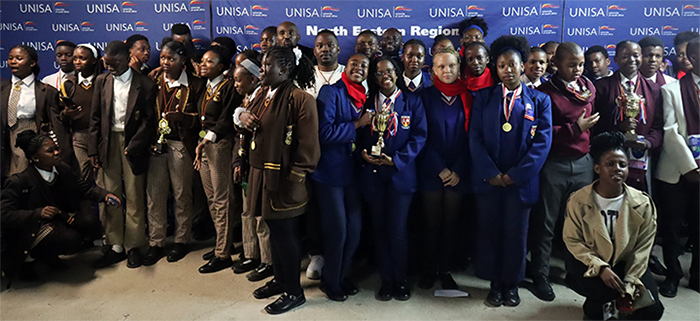News & Media
Honouring Dr OK Matsepe's legacy through debate

The winning teams from Dendron Secondary School (senior division, far right) and Noorderland High School (junior division, middle)
The Unisa Debating Society recently hosted the annual Dr OK Matsepe Debate Tournament at Maseala Progressive High School in Seshego, Polokwane. The event brought together over 150 learners from five districts across Limpopo, with 56 teams participating.
Through this tournament, the bright young minds of the province honoured the legacy of the late Dr Oliver Kgamedi (OK) Matsepe, a celebrated Northern Sotho author whose books were widely prescribed in secondary schools from the 1970s to the 1990s. In recognition of his immense contribution to indigenous languages, Unisa awarded him a posthumous honorary doctorate in 2024.
According to the organiser, Lesedi Jackson Senona, the tournament was designed to promote critical thinking, public speaking and intellectual engagement among learners, skills regarded as essential for developing future leaders in society.
The tournament featured challenging motions across both senior and junior divisions.
Senior division motions
- "This house regrets the influence of Western feminism on African gender discourse."
- "This house believes that South Africa should decolonise its education system by institutionalising indigenous language learning for all subjects."
Junior division motions
- "This house believes that social media comments should be protected by free speech."
- "This house supports compulsory voting in national elections."
After a series of intense and thought-provoking debates, Dendron Secondary School emerged victorious in the senior division while Noorderland High School claimed top honours in the junior division.
* By Lerato Maluleke, Communication and Marketing Intern, North Eastern Region
Publish date: 2025/08/29

 Unisa co-hosts G20 community outreach in the Eastern Cape
Unisa co-hosts G20 community outreach in the Eastern Cape
 Unisans gain membership of prestigious science academies
Unisans gain membership of prestigious science academies
 Advocating for disability transformation through servant leadership
Advocating for disability transformation through servant leadership
 Unisa Press continues to illuminate the publishing space
Unisa Press continues to illuminate the publishing space